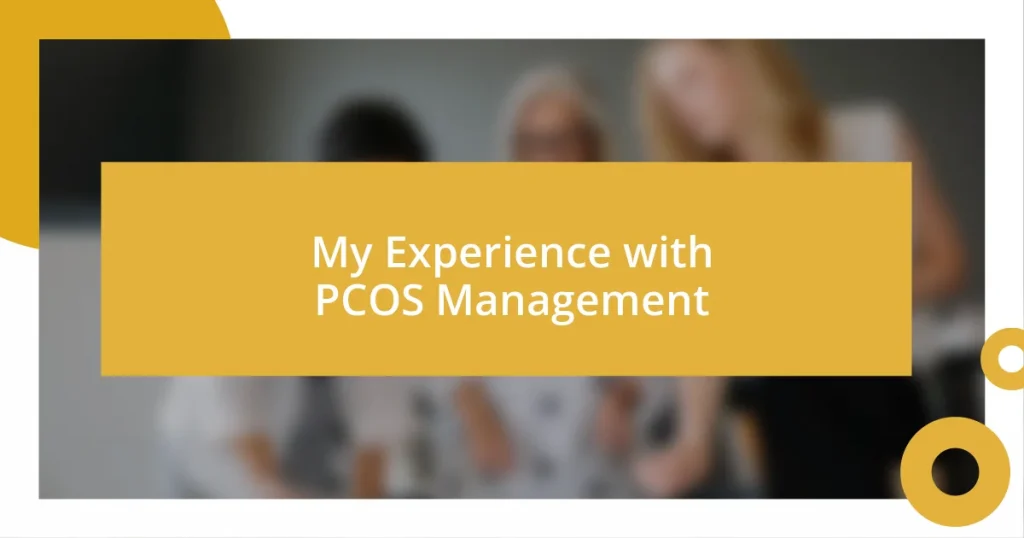Key takeaways:
- PCOS significantly impacts hormonal balance, mental health, and weight management; recognizing symptoms is essential for understanding the condition.
- Making lifestyle changes, including dietary adjustments, regular exercise, and mental wellness practices, plays a crucial role in effectively managing PCOS.
- Medical treatments, such as hormonal therapies and medications like Metformin, alongside emotional support from community networks, are vital for long-term success in managing PCOS.
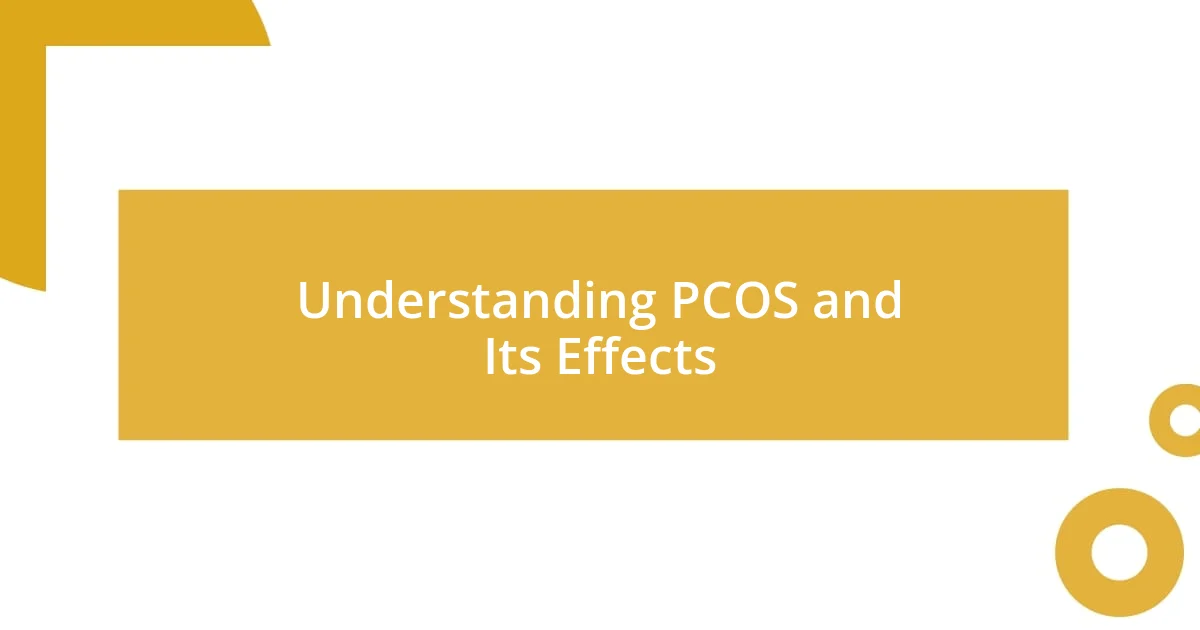
Understanding PCOS and Its Effects
Polycystic Ovary Syndrome (PCOS) is not just a name; it felt like a shadow that followed me for years. When I was diagnosed, I was flooded with questions: Why me? Would I ever feel normal again? The reality is, PCOS affects various aspects of life, from hormonal imbalances to mental health. Those fluctuating hormones often took me on an emotional rollercoaster, leaving me confused and drained.
One particularly challenging aspect for many women, myself included, was the struggle with weight management. I vividly remember the frustration of trying diet after diet, only to be met with minimal results. It made me wonder: Was it really just my lack of willpower, or was PCOS playing a substantial role in my body’s reactions? It was eye-opening to learn how insulin resistance—a common issue associated with PCOS—significantly impacted my metabolism, making it harder to shed those extra pounds.
Beyond physical symptoms, the emotional toll of PCOS can be immense. I often felt isolated, especially when friends shared experiences of easy pregnancies or regular cycles. It sparked feelings of inadequacy within me. This emotional weight is something that many women carry silently, and it often leads to anxiety and depression. Recognizing these feelings as valid is crucial in the journey of understanding PCOS and how it deeply influences our lives.
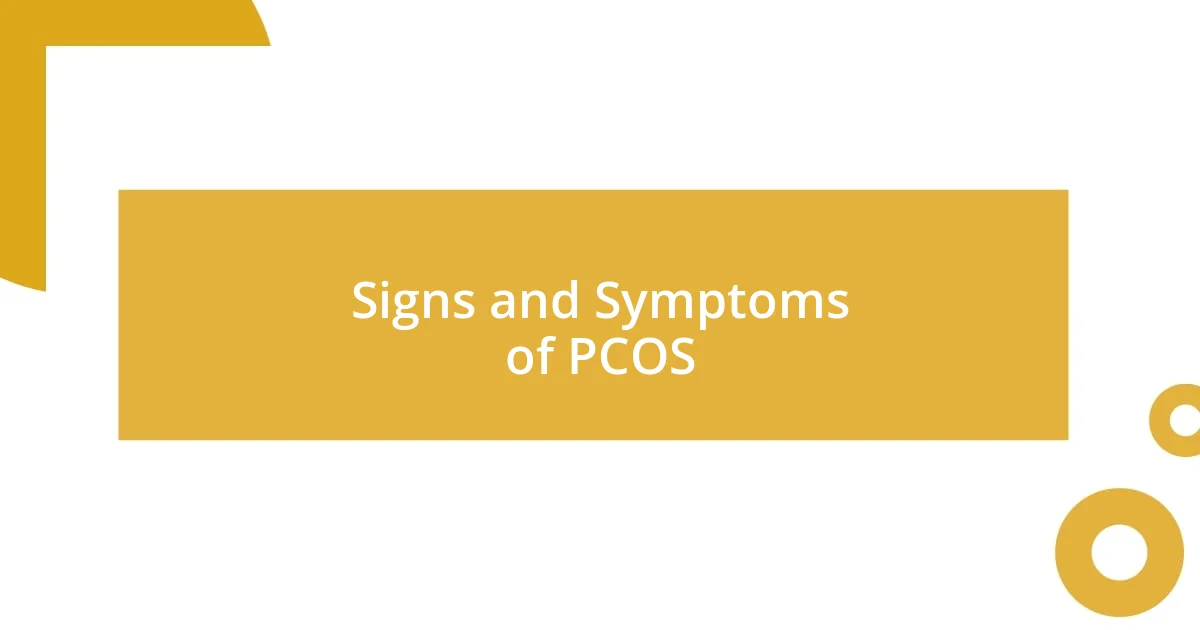
Signs and Symptoms of PCOS
When I first began to notice the signs of PCOS, I felt like my body was sending me mixed signals. Irregular periods were the most glaring red flag for me. I remember the stress of trying to decode my cycle, only to find it all over the place. Alongside that, I experienced changes in my skin; breakouts were constant and stubborn, no matter how much I invested in skincare products. It was as if my body was rebelling against me.
Here are some common signs and symptoms of PCOS that I encountered:
- Irregular menstrual cycles or missed periods
- Excess facial or body hair (hirsutism)
- Acne or oily skin
- Thinning hair or hair loss on the scalp
- Weight gain or difficulty losing weight
- Dark patches of skin (acanthosis nigricans)
- Mood swings or increased anxiety
Recognizing these symptoms as part of the PCOS experience helped me understand that I wasn’t alone. It’s a pattern I’ve come to appreciate as I navigate this complex condition; embracing these signs eventually led me to seek the right solutions that genuinely worked for my body.
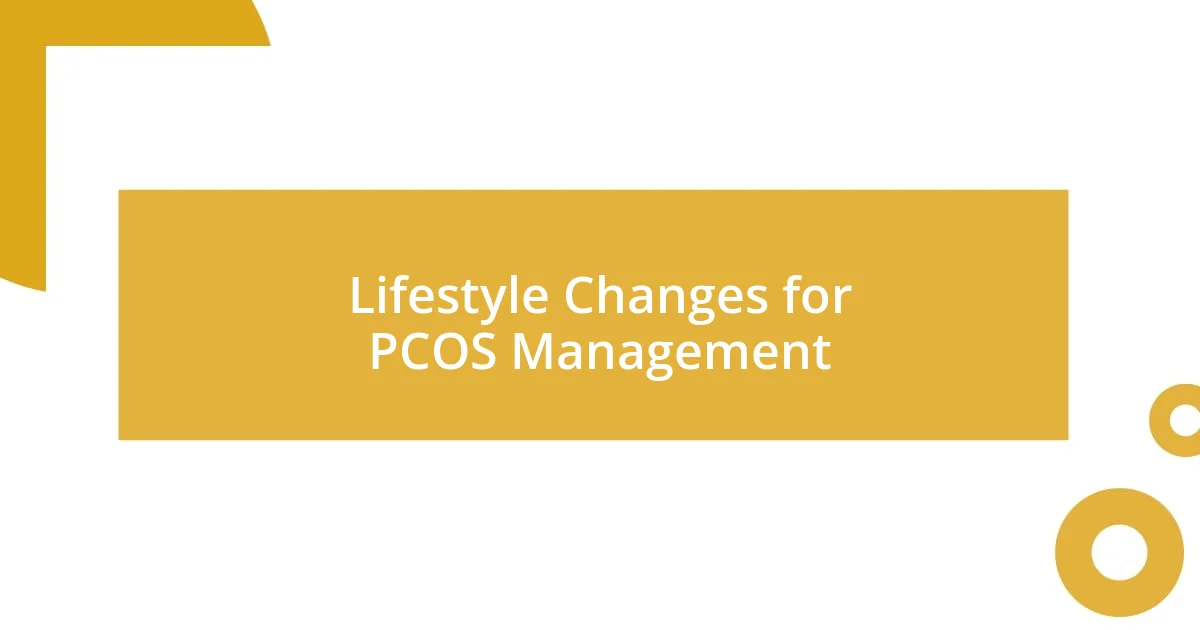
Lifestyle Changes for PCOS Management
I discovered that making lifestyle changes was key to managing my PCOS. One significant adjustment was my diet. I started incorporating whole foods, like fruits, vegetables, and lean proteins, instead of processed items that were packed with sugar. I recall feeling more energetic within weeks. Not only did it help with my weight, but I also noticed a noticeable reduction in my breakouts. This has been a powerful reminder of the connection between what we eat and how we feel.
Exercise also became a staple in my daily routine. Initially, I struggled to find motivation, but once I started walking regularly, I felt my mood lift as well. Connecting with friends for workout sessions transformed it into a fun activity rather than a chore. The beauty of this change is not just physical; the sweat and laughter lightened my mental burden, offering relief from stress. My experience has shown me that physical activity can influence our emotional well-being significantly.
Lastly, prioritizing mental wellness transformed my approach to PCOS management. I began practicing mindfulness and meditation after feeling overwhelmed at times. These practices grounded me, helping me navigate the tumultuous waves of emotions that often came with PCOS. The clarity gained from just a few minutes of daily introspection truly altered my perspective. I realized that managing PCOS isn’t merely about dietary restrictions and physical activity; it’s about embracing a holistic approach to health.
| Lifestyle Change | Benefit |
|---|---|
| Dietary Adjustments | Improved energy levels and reduced breakouts |
| Regular Exercise | Enhanced mood and stress relief |
| Mental Wellness Practices | Increased clarity and emotional stability |
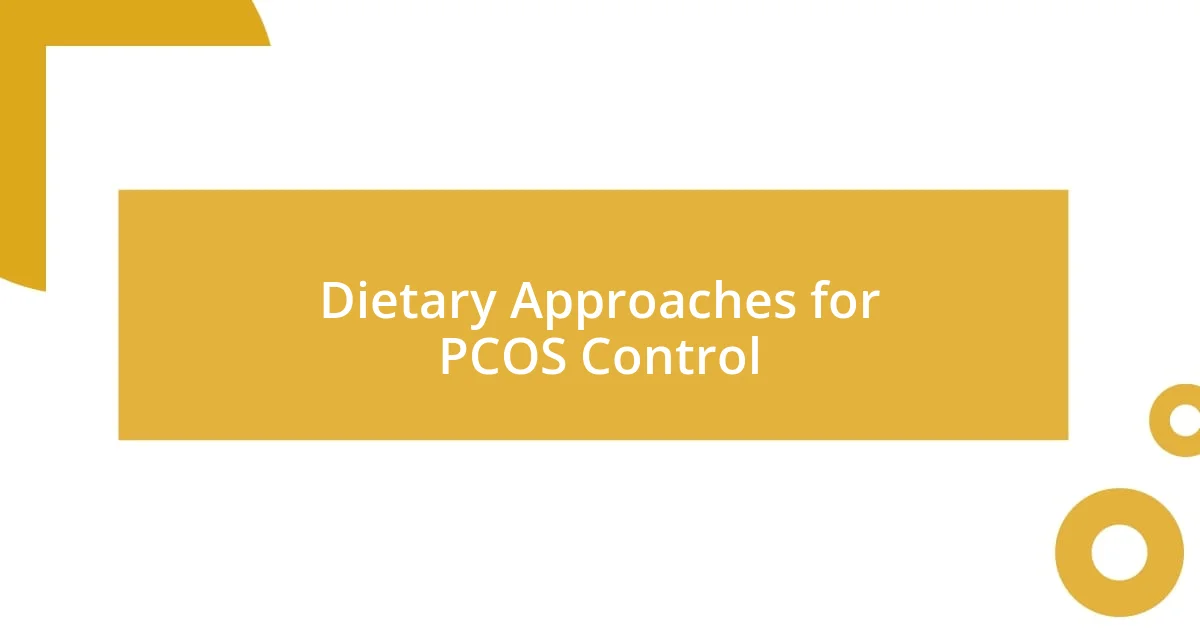
Dietary Approaches for PCOS Control
Adjusting my diet was a game-changer for my PCOS management journey. I began by eliminating refined carbohydrates and sugary snacks that had been a staple in my diet. It surprised me how quickly the cravings faded once I swapped in whole grains and healthy fats. Did you know that the glycemic index (GI) of foods can significantly affect insulin levels? I felt the difference almost immediately—my energy levels stabilized, and those pesky mood swings simmered down.
I also discovered the importance of meal timing. I started eating smaller portions more frequently throughout the day instead of indulging in huge meals. This approach not only curbed my hunger but also made me feel lighter and more vibrant. I remember how rewarding it felt to listen to my body, responding with nourishment instead of overindulgence. It’s amazing how a simple change in my eating pattern could have such a profound impact on my overall well-being.
Incorporating foods rich in omega-3 fatty acids, like salmon and chia seeds, became a delightful addition to my meals. The moment I noticed my skin beginning to clear up was truly euphoric. Have you ever experienced a boost in confidence simply from what you put on your plate? I realized that nourishing my body with the right nutrients was not just about physical health; it truly enhanced my emotional resilience. Every bite became a small act of self-love, showing me that I could take control of my PCOS in a compassionate and nurturing way.
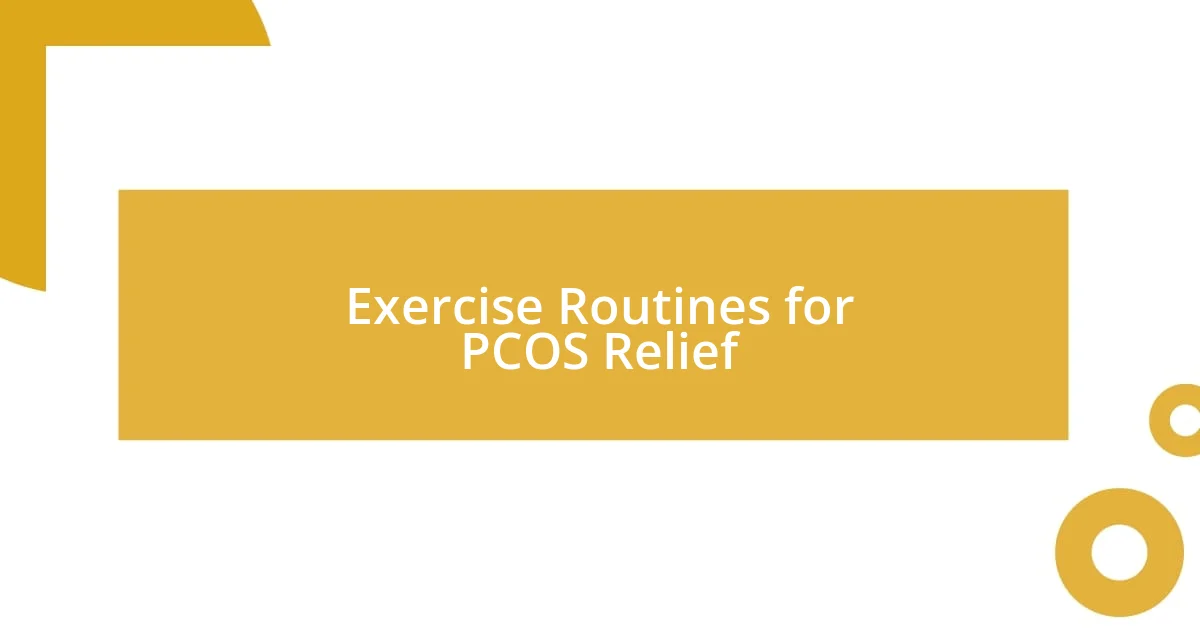
Exercise Routines for PCOS Relief
Integrating a consistent exercise routine into my life made a tremendous difference in managing my PCOS symptoms. Initially, I found myself dreading workouts—thinking they’d feel like yet another obligation. However, I decided to try dance-based fitness classes, which turned out to be an absolute joy! Each session not only lifted my heart rate but also lifted my spirits, reminding me that staying active doesn’t always have to be a grind. Have you ever experienced the freedom of movement? For me, it felt transformative.
Strength training also became a vital component of my exercise routine. At first, I wasn’t sure how to start, but a few online tutorials sparked my curiosity. I remember the thrill of lifting weights for the first time—feeling empowered and capable. As I gradually built strength, I noticed my body responding positively; I felt stronger and more in control. It turns out that muscle mass can help improve insulin sensitivity, which is crucial for those of us with PCOS. Who would’ve thought that unloading stress through lifting weights would also lead to better energy levels?
Yoga became a cherished practice as well. I had some misconceptions about it being too calm for my personality, but trying out a more dynamic style revealed its remarkable benefits. The moments spent stretching and breathing allowed my mind to ease and my body to recover. After each session, I felt lighter, almost as if I was shedding not only physical tension but emotional baggage as well. Isn’t it incredible how movement can unlock so many layers of our well-being? I’ve found that running, dancing, or even practicing yoga can be therapeutic not just physically, but mentally as we navigate the challenges of PCOS together.
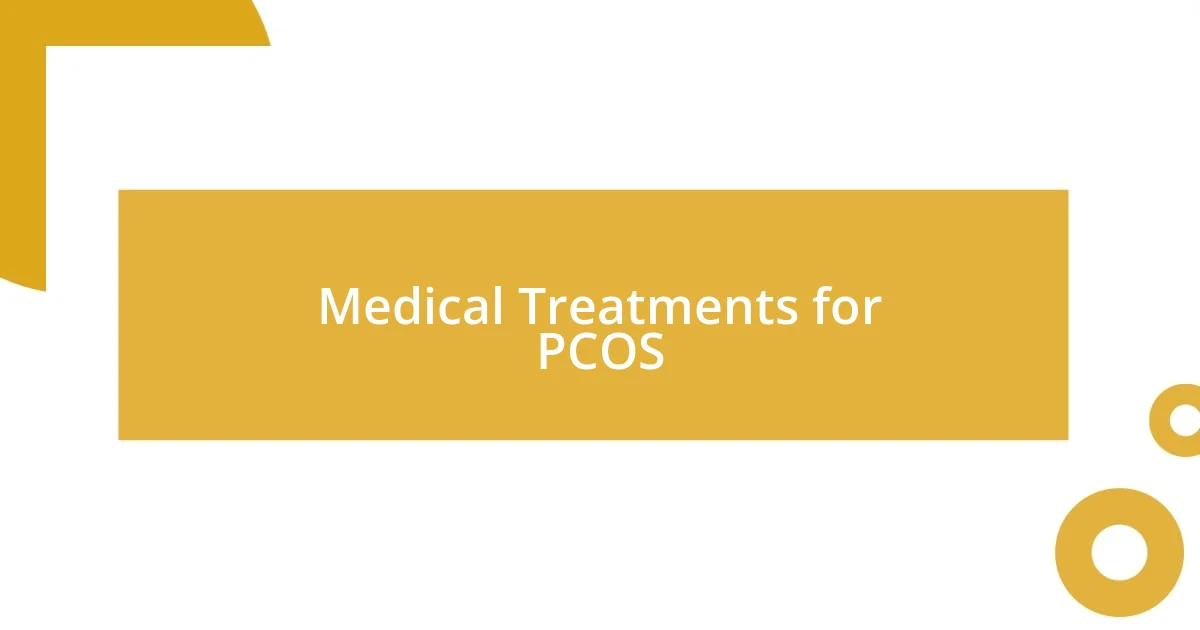
Medical Treatments for PCOS
Medical treatments for PCOS often start with hormonal therapies, like birth control pills. I remember feeling hesitant about this option at first, but once my doctor explained how these pills could help regulate my menstrual cycle and reduce symptoms like acne, I was intrigued. It’s fascinating how something so common has the potential to impact our hormonal balance so significantly, isn’t it?
Additionally, Metformin, a medication commonly used for type 2 diabetes, has proven beneficial for many with PCOS. I was surprised when my doctor suggested it, as I had always associated it with diabetes management. But as I learned, it can help improve insulin sensitivity and aid in weight management. When I started taking it, I noticed that my cravings decreased, and my energy levels stabilized, making me feel more in control of my health journey.
For women struggling with infertility due to PCOS, fertility medications like Clomiphene citrate can offer hope. I spoke with a close friend who personally navigated this path, and her journey brought a real sense of community around this issue. Hearing her stories of determination—and the emotional roller coaster she experienced—made me appreciate the importance of support systems during these challenging times. It’s comforting to know that there are medical avenues to explore, but the emotional impacts of these treatments often reach far beyond physical health.
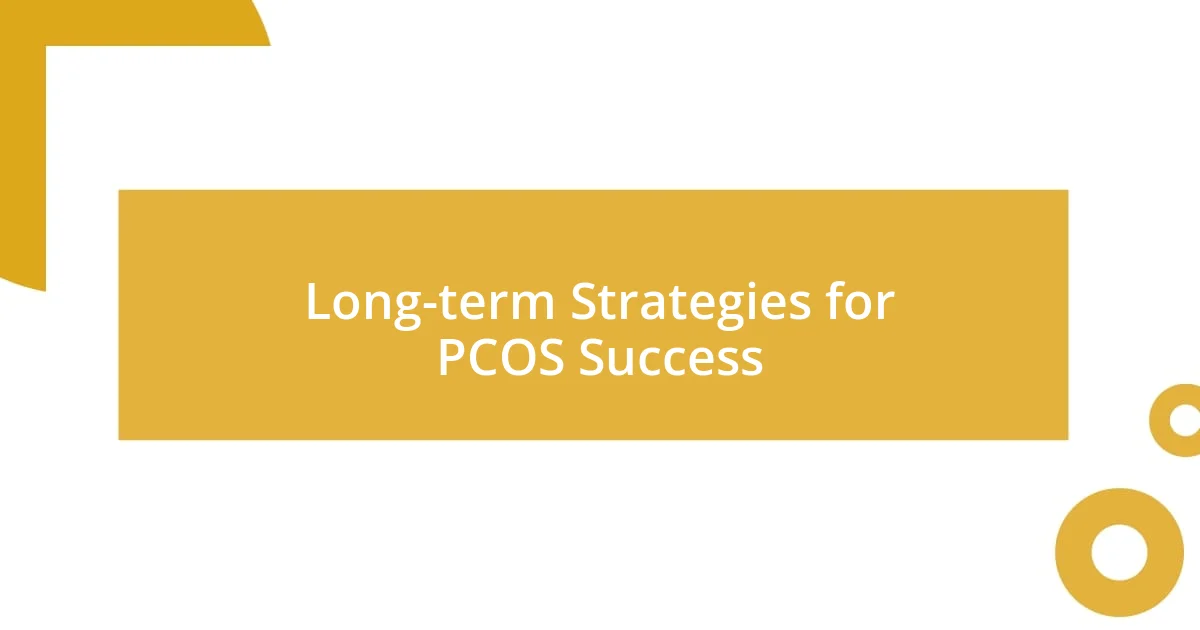
Long-term Strategies for PCOS Success
Managing PCOS over the long term requires a multifaceted approach that embraces both dietary changes and emotional well-being. When I started tracking my food intake, I found that keeping a food journal was illuminating. At times, I was shocked to realize how my choices affected my energy and mood levels. Have you ever noticed how certain foods influence how you feel? By incorporating more whole foods like vegetables, lean proteins, and healthy fats, I didn’t just lose weight; I gained a newfound relationship with food, seeing it as fuel rather than just sustenance.
Emotional support has played an equally crucial role in my PCOS journey. I remember joining a group of women who share similar experiences. Each story we shared felt like peeling away layers of isolation. It’s a relief to realize you’re not alone, isn’t it? This sense of community fostered a deeper understanding of my condition and helped me feel empowered. Conversations turned into strategies we could all use, such as mindfulness practices. I started to implement simple mindfulness exercises, and over time, I noticed my anxious thoughts about PCOS began to diminish.
Lastly, regular check-ins with my healthcare team became invaluable in staying on track. I can’t stress enough how meaningful it is to have open dialogues about our progress and setbacks. When I had a bad month, I learned that transparency with my doctor allowed for adjustments in treatment. Have you ever felt that relief from simply sharing your struggles? In those moments of vulnerability, I discovered that long-term success truly hinges on a partnership between myself and my healthcare providers, creating a tailored approach that truly fits my life.









